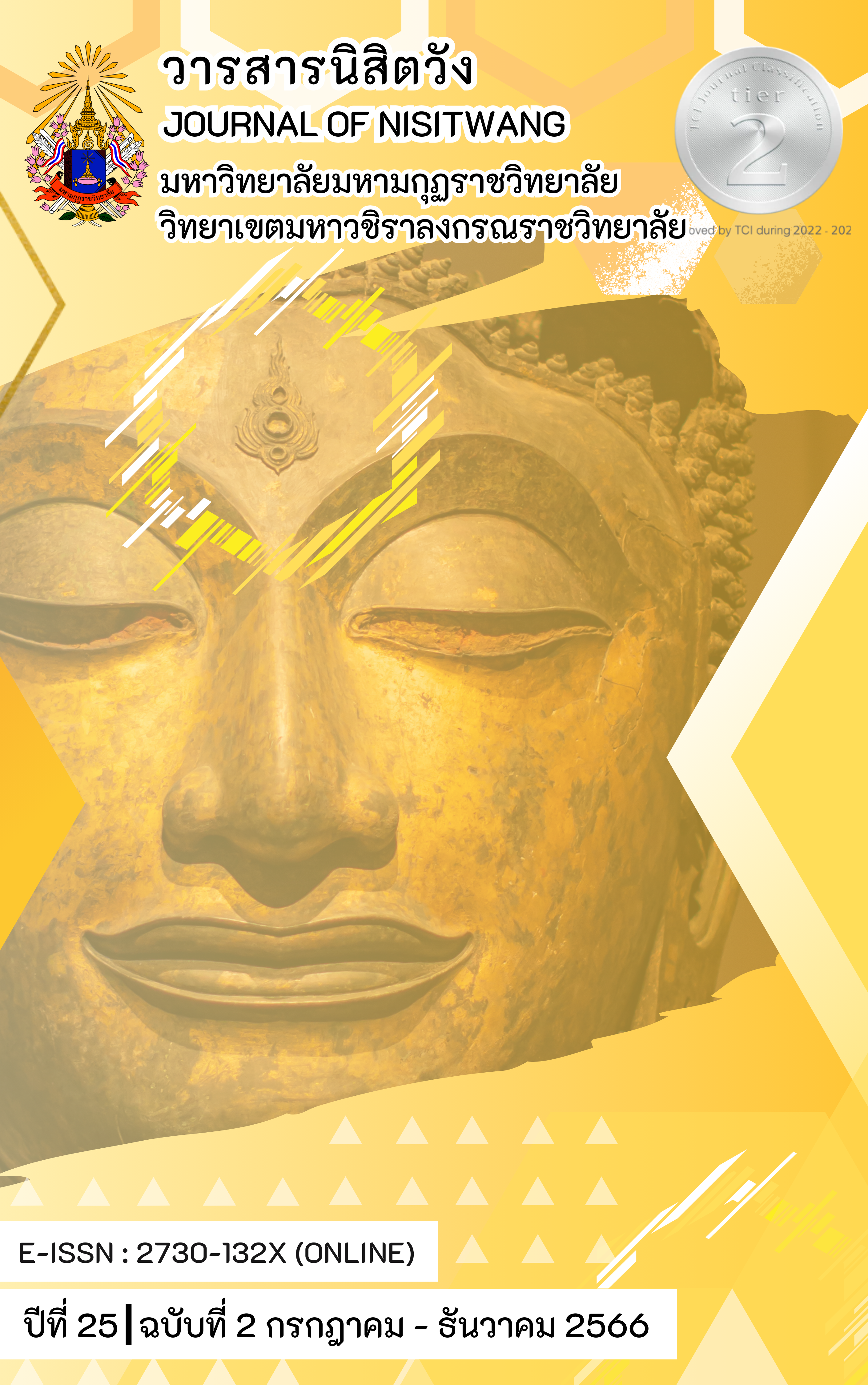ผลการจัดการเรียนรู้โดยใช้ปรากฏการณ์เป็นฐาน ตามรูปแบบ READS วิชาการพัฒนาหลักสูตร ระดับปริญญาตรีชั้นปีที่ 2
Main Article Content
บทคัดย่อ
การวิจัยครั้งนี้มีวัตถุประสงค์เพื่อศึกษาผลการจัดการเรียนรู้โดยใช้ปรากฏการณ์เป็นฐาน ตามรูปแบบ READS โดยมีวัตถุประสงค์ย่อยเพื่อ (1) เปรียบเทียบผลสัมฤทธิ์ทางการเรียนระหว่างก่อนและหลังการจัดการเรียนรู้โดยใช้ปรากฏการณ์เป็นฐาน ตามรูปแบบ READS วิชาการพัฒนาหลักสูตร ชั้นปริญญาตรีปีที่ 2 และ (2) ศึกษาความพึงพอใจของนักศึกษาที่มีต่อการจัดการเรียนรู้โดยใช้ปรากฏการณ์เป็นฐาน ตามรูปแบบ READS วิชาการพัฒนาหลักสูตร ชั้นปริญญาตรีปีที่ 2 กลุ่มตัวอย่างที่ใช้ในการวิจัย เป็นนักศึกษาชั้นปริญญาตรีปีที่ 2/1 ของวิทยาลัยนาฏศิลปลพบุรี สถาบันบัณฑิตพัฒนศิลป์ กระทรวงวัฒนธรรม ภาคเรียนที่ 1 ปีการศึกษา 2565 จำนวน 28 คน ซึ่งได้มาจากการสุ่มแบบกลุ่ม (Cluster Random Sampling) โดยการจับสลากห้องเรียนเป็นหน่วยการสุ่ม จำนวน 1 ห้องเรียน เครื่องมือที่ใช้ในการวิจัย ได้แก่ (1) แผนบริหารการสอน วิชาการพัฒนาหลักสูตร ชั้นปริญญาตรีปีที่ 2 (2) แบบทดสอบวัดผลสัมฤทธิ์ทางการเรียนวิชาการพัฒนาหลักสูตร ชั้นปริญญาตรีปีที่ 2 มีค่าความเชื่อมั่น เท่ากับ 0.89 และ (3) แบบประเมินความพึงพอใจของนักศึกษาที่มีต่อการจัดการเรียนรู้โดยใช้ปรากฏการณ์เป็นฐาน ตามรูปแบบ READS วิชาการพัฒนาหลักสูตร ชั้นปริญญาตรีปีที่ 2 มีค่าความเชื่อมั่น เท่ากับ 0.79 สถิติที่ใช้ในการวิเคราะห์ข้อมูล ได้แก่ ค่าร้อยละ ค่าเฉลี่ยค่าส่วนเบี่ยงเบนมาตรฐาน และสถิติทดสอบที (t–test) แบบ Dependent
ผลการวิจัยพบว่า
(1) ผลสัมฤทธิ์ทางการเรียนหลังการจัดการเรียนรู้โดยใช้ปรากฏการณ์เป็นฐาน ตามรูปแบบ READS วิชาการพัฒนาหลักสูตร ชั้นปริญญาตรีปีที่ 2 สูงกว่าก่อนการจัดการเรียนรู้ อย่างมีนัยสำคัญทางสถิติที่ระดับ .05
(2) ความพึงพอใจของนักศึกษาที่มีต่อการจัดการเรียนรู้โดยใช้ปรากฏการณ์เป็นฐาน ตามรูปแบบ READS วิชาการพัฒนาหลักสูตร ชั้นปริญญาตรีปีที่ 2 โดยภาพรวม นักศึกษามีความพึงพอใจอยู่ในระดับมาก (x̅=4.43, S.D.=0.25)
Article Details
เอกสารอ้างอิง
กระทรวงศึกษาธิการ. (2551). หลักสูตรแกนกลางการศึกษาขั้นพื้นฐาน พุทธศักราช 2551. กรุงเทพฯ :
โรงพิมพ์ชุมนุมสหกรณ์การเกษตรแห่งประเทศไทย.
ทิศนา แขมมณี. (2554). ศาสตร์การสอน องค์ความรู้เพื่อการจัดกระบวนการเรียนรู้ที่มีประสิทธิภาพ.
พิมพ์ครั้งที่ 15. กรุงเทพฯ : สำนักพิมพ์แห่งจุฬาลงกรณ์มหาวิทยาลัย.
บุญชม ศรีสะอาด. (2556). การวิจัยเบื้องต้น. พิมพ์ครั้งที่ 9. กรุงเทพฯ : สุวีริยาสาส์น .
พงศธร มหาวิจิตร. (2562). การประยุกต์ใช้แนวคิดการเรียนรู้โดยใช้ปรากฏการณ์เป็นฐานร่วมกับการเรียนแบบ
เชิงรุก ในรายวิชาการประถมศึกษา เพื่อเสริมสร้างทักษะการเรียนรู้ในศตวรรษที่ 21. วารสารศึกษาศาสตร์ มหาวิทยาลัยขอนแก่น, 42 (2), 73-90.
ภวิศา พงษ์เล็ก. (2560). เอกสารประกอบการสอน หลักการและปรัชญาการศึกษา. คณะครุศาสตร์ มหาวิทยาลัยราชภัฏอุดรธานี.
รวินันท์ สัจจาศิลป์ และชลาธิป สมาหิโต. (2562). ผลการจัดประสบการณ์การเรียนรู้โดยใช้ปรากฏการณ์เป็นฐาน ผ่านการสร้างสื่อจําลองที่มีต่อความสามารถด้านมิติสัมพันธ์สำหรับเด็กปฐมวัย. วารสารศึกษาศาสตร์ มหาวิทยาลัยศิลปากร, 16 (2), 34-42.
วิจารณ์ พานิช. (2555). วิถีสร้างการเรียนรู้เพื่อศิษย์ในศตวรรษที่ 21. กรุงเทพฯ : มูลนิธิสดศรี-สฤษดิ์วงศ์.
Knowles M.S. (1975). Self-Directed Learning : A Guide for Learner and Teachers. Chicago : Association Press.
Somkiart Intasingh. (2019). Development of Learning Management Model by Integrating
PhenoBL Approach and DTP to Promote Curriculum Knowledge, Innovative Thinking
Ability, and Achievement Motivation of Thai Pre-Service Teachers. ASEAN Journal of
Education, 5 (2), 21-32.
Symeonidis, V., & Schwarz, J. F. (2016). Phenomenon-Based Teaching and Learning through the
Pedagogical Lenses of Phenomenology : The Recent Curriculum Reform in Finland. Forum
Oświatowe, 28 (2), 31-47.
Varinporn Funfuengfu. (2022). The development of Phenomenon-Based Learning Model for enhancing Active learning Competencies of Teacher Students. International Journal of Positive School Psychology, 6 (7), 1366–1377.


